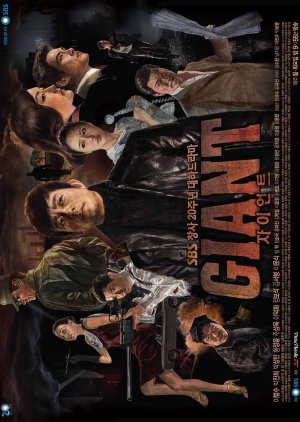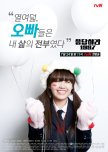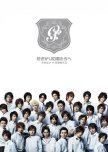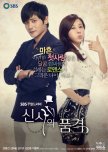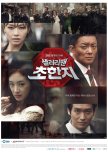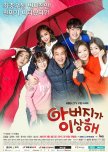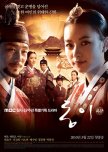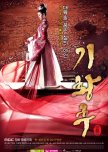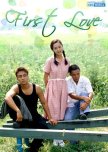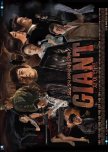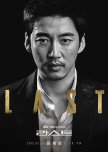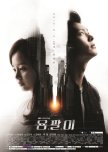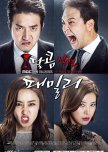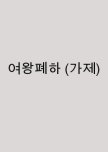
The writing is a bit sketchy in the initial episodes, with extra servings of trauma and some odd lapses in logic. However, the child actors are terrific (why hello, future stars!), and they morph into equally terrific adult actors. The male characters are particularly nuanced, as we watch two generations struggle to drag themselves and their country out of dire poverty. It isn’t always pretty, and I appreciated the show’s willingness to give all of its characters dark edges, especially since it’s equally willing to give them all moments of insight and grace. The female characters initially tend towards angelic but dim or shrewish and evil, but they also become more complex as the show progresses.
Keeping a 60 episode show engaging is no easy task, and Giant does it with sophistication, style and humanity. It has plenty of “big” moments, but it never forgets that even the most ordinary activities can be dramatic. It finds poetry in mud flats and rock piles, and in the rough-edged men fighting to build a nation from them at any cost.
Considerați utilă această recenzie?

Această recenzie poate conține spoilere
Giant is an epic about the life&love of 3 siblings during highspeed urban development of Gangam
"Giant" offers a dramatically stirring ride through 4 decades of recent South Korean history - 60 episodes tell a touching, upsetting, emotionally stirring and complex story set in the context of a turbo-fast urban development process in Seoul, south of the Han River: Gangnam.In passing, those episodes tell the story when Seoul and its people had to deal with a phenomenal population explosion: in 1953, 1 million people lived in Seoul. In 1960 it was 2.45 million and in 1970 it was already 6 million. Visions and plans were in demand, as were quick practical solutions and investments. Real estate speculation created a veritable gold rush atmosphere. "Giant" is about these 'gold diggers' in particular. (...and this hype about real estate speculation in Gangnam hasn't stopped until today...)
"Giant" is an epic. It is a monument and a memorial to the efforts and sacrifices of many people. The autocratic (and also often corrupt methods) of urban development become comprehensible if one considers them against the background of their time: the military dictatorship, which was inevitably characterized by the powerful influence of persons with military background in political and social decision-making processes (if you like see side note below). Instead of technical arguments and detailed examination, influence, money, bribery and position often had the say at the crucial interfaces.
If you pay a little more attention to the seemingly irrelevant details, "Giant" provides a crash course in recent South Korean history. (If you don't know or care about it, some things might be rather arbitrary or interchangeable.) In any case, the series has reached the South Koreans. In the course of its success, a further 10 episodes were added to the originally planned 50 episodes. For 40 percent of the viewers, "Giant" ranked first at the end of the 60th episode in 2010.
Ok, admittedly, there are 60 episodes. But when the time is right, you can confidently get involved. "Giant" is worth seeing. The story is told in a colorful way and played fantastically. It is emotionally gripping, touching, exciting. We accompany the protagonists over almost half a century: from their childhood in the 1970s to the year 2010. This means that actors can also show what they are made off by playing the protagonists as young. (Today they are stars of the 2020s: Yeo Jing-goo and Kim Soo-hyun). All in all, without exception, everyone delivered a strong performance. Last but not least, villain number 1, Jeong Bo-seok as Jo Pil-yeon, who holds his role brilliantly from the first to the last episode, is vividly remembered with his ice-cold laugh, which never got stuck in his throat - even in the most adverse headwinds.
The KDrama takes a sophisticated approach in telling the historical events and dynamic processes of the time through the eyes and hearts of three siblings. So, we tightly follow these stirring personal processes on the one hand, and several dubious machinations of the (fictitious) masterminds (who are quite close to the real events - see below) on the other. Against the historical background of those decades, in spectacular loopings the dramatically revolving wheel of fortune is allowed to turn to the fullest again and again, emotionally throwing the audience wildly around. KDrama shows it all.
"Giant" offers numerous stirring twists and upsetting turns in matters of love and rivalry, guilt and atonement, revenge and forgiveness. It won't be boring. All this surrounded by an indeed spectacular Gangnam urban development dynamic - at a dizzying high speed from no man's land to the hip trend district - which was not least favored by the autocratic control.
-------------------- SIDE NOTE: --- Gangnam highspeed development thanks to autocratic urban development during military dictatorship ----
There are details of everyday life during the PARK DICTATORSHIP: the influence of the military in all sorts of social issues, the secret service KCIA, which interfered unrestrainedly in domestic political issues and investigations and even used torture to interrogate people. Positions of power, like mayors, being appointed according to their military background and the level of their allegiances with Park. The backroom networks where the places, where the real decisions were made.
There are details of the subsequent DICTATORSHIP under CHUN DO-HWAN: the curfew during the state of emergency under martial law, for example. The brutally crushed democratic aspirations. The establishment of educational concentrations camps - "Giant" refers to the Samchung Camp in Yeoncheon, Gyeonggi, which was set up under the guise of fighting the threat posed by North Korean Communism. In this peculiar concentration camp, at least 60,000, probably even up to 100,000 innocent South Korean citizens were held captive in the former military prison under the most brutal conditions without an arrest warrant. There was talk of 'cleansing'. In fact, it was pure arbitrariness, verging on sadism.
And finally there is TRUE DEMOCRATIZATION of the system after the first free election for a long time - however, sadly, being faced with the same personnel (in autocratic tradition) in decisive ranks.
It has been proven that the military past in many political leadership positions during the Park dictatorship was not accidental but intentional. Among other things, of 6 Seoul mayors of that time (these were appointed, not elected), 3 had a military background. The other three were known for their expressed loyalty to the Park regime. Such people of Park's trust got the chance and used their past, their networks and opportunities as a robust standing, from where they set visionary course for the future of the capital with all means. Otherwise, rarely had the urbanization of Gangnam been as rapid as during those decades.
Gangnam beauty industry, the relevant corporate headquarters of the KPop industry, the suites and penthouses of the richest of the rich in the most exclusive apartment blocks of the country, temples of consumption of numerous luxury brands, hotspots for leisure and culture as well as some of the most prestigious schools contribute to Gangnam's dazzling image today. Gangnam with a population of over 1/2 Million recently is one of the economically most important urban districts of Seoul, in whose towers, which rise ever higher into the city sky, the very large companies of the country have their headquarters. A central transport hub has emerged and even the Ministry of Trade, Industry and Energy has taken political presence here.
It's hard to believe that 60 years ago this district south of the Han River (강 - Gang = river and 남 - Nam = south) stood for flood plains and agriculture - especially cabbage fields and plantations with the Korean Nashi pear. It was an unattractive no man's land, considering you want urban city life.
This had changed in the 1970s after Seoul faced a massive population explosion, the consequences of which the city could not cope with under the given circumstances. Previously, the city's political, economic and cultural heart had been on the north bank of the Han River in Gangbuk - in fact, since the dawn of the Joseon Dynasty. But between 1953 and 1960, in just 7 years, the population had more than doubled, practically 'overnight', from 1 million to 2.45 million. In 1970 it had already reached around 6 million! Nobody had been prepared for this. Chaos was the result. Infrastructure collapsed, slums literally sprouted out of the ground.
That's when the vision of a whole new district south of the river was born. In 1966 it was announced for the first time that the population should be redistributed in the future: 40 percent of the population should live in the northern area, 60 percent in new and densely built Gangnam. A dream in distant clouds, that's how it seemed back then, because there was nothing there at that time.
In the 1970s, the planning took on more concrete forms. Gangnam has been defined as one of Seoul's 3 central urban cores alongside the historical old town and the political center of Yeouido. In order for this to happen, construction of today's Hannam Bridge had already begun in 1966. In 1969 this important connection was completed and the first milestone was reached. Also, the Gyeongbu Expressway was opened in 1970. However, to speed up the development, Gangbuk was deliberately disadvantaged and Gangnam was privileged, for example with tax breaks. An express bus terminal was built, elite schools were relocated and comfortable new apartments were advertised. Stylish urbanity was marketed on one plot, yet rural wasteland was right next to it. The contrasts were enormous.
Yet, residential buildings started to grow at breakneck speed and people began to move to the new southern neighborhoods.
Strictly speaking, Gangnam and the education of an elite school district also marks the beginning of the now enormously profitable private education market and some social excesses, which to this day provide the KDrama market with plenty of material for the most bizarre stories. In addition, speculation in real estate became fashionable and became a new hobby for (more or less) rich wives. Eventually, Gangnam also earned its reputation as an entertainment district, with clubs staying open all night.
The story of Gangnam reads dazzling and spectacular. But the city itself initially had no money for all the investments that were necessary to develop the land. It relied on income from sale of the land set out for recompense from the land readjustment programs. All started slowly, because interested buyers withdrew, disappointed since there was hardly anything really urban in Gangnam in the early 1970s. In order to speed up the processes, a law was passed in 1972 that deliberately relaxed the existing tax regulations relating to property regulations. From then on, profits from real estate speculation were practically tax-free. Trade tax, property tax, etc. were also waived for the next 6 years. This temporary incentive for investors proved extremely successful, but also problematic. This brought speculators onto the scene, who didn't care at all about professional urban development as such.
Thus, remarkable performance comes with sad collateral damage. The catastrophes associated with sloppiness in construction and human fault in the wake of corruption pave the decades just as much as the milestones of urban development. The biggest accidents in this context were, for example, the collapse of the Wawoo residential complex and the Seongsu Bridge. (Others followed at regular intervals. Every decade has its own list...)
Autocratic regulations, the need for speed and the money involved also encouraged flourishing and unchecked corruption regarding insider trading with real estate speculation, building tenders and bidding. Bribery shaped the entire business world. This also promoted a climate in which - if someone was convicted of his illegal activities - he (usually a 'he') was easily released soon later on.
While the giants were able to pocket their gigantic profits without restraint, the population of Gangnam suffered (and still suffers) from housing costs that exceed every measure.
Finally, within this whole developmental process, the lending business has been a crucial and lucrative business since the very beginning until up to date, even if customers and their needs may have changed in the meantime...
Considerați utilă această recenzie?

KdramaQueen89
31 oamenii au considerat această recenzie utilă
Story: It starts off with the child stories and here is where you see everything (father's death, siblings seperated, meeting of the romantic OTP #1) go down. When the characters grow up, there are multiple time jumps and twist and turns throughout to keep you engaged till the very end. Be prepared to cry a lot and be shocked at how the romantic pairings go (they are twisted). I loved the ending although it was bittersweet. I will say that this definitely could have been done with a shorter ep count because there were many filler scenes.
Acting: Excellent ensemble cast. Everyone from the 2 main couples to the supporting cast was amazing. I got attached to all the characters and it was crazy how everyone who is considered protagonists also showed a bad side to them. The writers did a phenomenal job in writing these characters. Just wanted to mention I wasnt too keen on Lee Bum Soo in the beginning but by the end I had become a fan! The chemistry btwn him and Park Jin Hee was perfect.
Music: The score was so fitting. Powerful when it needed to be and emotional in all the right places.
Rewatch: Although its a large ep count, I loved the acting so much that i would like to try and watch this every year if i have the time cause its so epic.
Overall Giant is a must watch for any die hard drama fan and the perfect introduction to Lee Bum Soo. Dont be turned off by the huge ep count or you will be missing out!
Considerați utilă această recenzie?

TheTranquilKnight
23 oamenii au considerat această recenzie utilă
Giant caught my attention when I added Salaryman to my list. I watched 5 episodes at that time and I failed to continue. In my second attempt I watched 20 episodes and I had to stop after 20 episodes because of exams. This time I managed to finish it within a week! It was really addictive.
Giant is a period drama set in 70s-90s. It's story of development of Gangnam & Seoul, political environment of Korea Republic at that time. Characters' stories of struggle-rise-fall has a base of revenge & betrayal. Giant has a very detailed business & political plot (not detailed realistically but compared to any motion media there is a good amount of detail). Nice representation of business, money, politics, power & greed. All of it was very dirty (not as dirty as reality). Very smart & unpredictable (mostly).
Other than business & politics another major theme is the sweet family & friendships. Alongside them there are little love stories. However, the love stories are not lovey-dovey but perfect amount for romance lovers.
Every character has depth and reason of their actions & ambitions. Male characters are great but I want to highlight the female characters. Females of Giant are very balanced. They are intelligent in their work & self-assertive in nature...in short they're kickass!
You can't categorise Giant in a genre. It has all kind of content except horror & fantasy. No dull & needless moments. Everything was necessary & strong enough to maintain interest. However, I felt a few episodes in the 40s were a little weak; still weakest episode deserves a 9!
Also it gives a rough idea of political situations and changes of South Korea at that time & construction development of Seoul.
Acting/Casting:
Excellent casting. I watched Salaryman so most of them were familiar. Everyone was great. I especially like Lee Duk-hwa, Lee Ki-young, Lee Mun-shik & Kim Suh-hyung.
Actresses were good. Park Jin-hee was fine & Hwang Jung-eum...well, she felt somewhat like a misfit. Her character was cute & naïve but she overdid it...I think.
Joo Sang-wook was really good but who is my favourite actor choice in Giant? Lee Beom-soo...nope. My favourite actors were Park Sang-min & Jung Bo-suk. At the beginning I was excited because of presence of Beom-soo in the cast and he was great but I didn't like him as much as I liked Park Sang-min & Jung Bo-suk. Beom-soo overacted a few times but Sang-min & Bo-suk both were always natural. Bo-suk was always blossomed; so was Sang-min! But Sang-min was extra special in family scenes.
I wanted to go into the screen and beat Bo-suk's character to the pulp & to hug Sang-min's character.
Music:
Soundtrack & songs used in the whole show were awesome. Soundtracks synchronised well with the situations.
Also in the first 40 episodes you'll frequently listen to some parts of classic Korean songs...I liked most of them.
Who should watch this?
-If you like business & political themes.
-Romance fans
-Everyone except following
Who should avoid this?
-Romance fans (those who want lovey-dovey romance in each & every episode)
-Those who can't handle family conflicts (minor)
-Those who can't handle tension (not depression)
-Those who can't breathe in ahjussi/grandpa/ahjumma galore & want pleasant sceneries of actors/actress to survive.
-Low tolerance of evil. Those who think that 'Boys Over Flowers'/'Secret Garden' moms & 'I Hear Your Voice'/'City Hunter' ahjussis or any other popular evil characters are the most evil then you should think twice before watching Giant....because those mentioned characters are just foetus of evil. In Giant you'll face complete evil.
Re-watch value:
Definitely a re-watch material! Despite being a 60 episode long show; I'll definitely go through this excitement many times in future.
Giant has everything...I laughed, cried, became tense &…....cursed like I never did (I realised that my tongue is dirtier than I thought!).
Giant is best in revenge, business & political category (not just Korea) & my 2nd best Korean show!
I recommend this to everyone, if you're afraid of length then don't be; it's addictive and you'll feel 60 episodes are less.
Considerați utilă această recenzie?

NewKDramaAddict
15 oamenii au considerat această recenzie utilă
Considerați utilă această recenzie?

The story is well balanced.It's a combination of drama,revenge,romance,music and a little comedy.You know,I started to watch the first episode and I couldn't stop!This drama has that something that you cannot define but which attracts you and keeps you with your heart between your teeth until the end.
The acting was very good.Jung Bo Suk played one of the craziest villains,Jo Pil Yeon.The love of the three brothers is unforgettable.I felt the emotion emitted by them, I cried with them, I laughed with them and all that they felt I felt too.The chemistry between the main couple(Lee Bum Soo & Park Jin Hee) was,hmmm,good.But what touched my soul was the second couple(Hwang Jung Eum & Joo Sang Wook).
The music was very good.
I don't watch the same drama a second time but this one I think I will watch it a million times. ^_^
Hmmm,overall 10.
Considerați utilă această recenzie?

This drama completly surprised me!
I have to say that usually I can't really stand long dramas! But this is really an expeption!
It was perfect.
The final was perfect, the drama wasn't predictable at all, the characters were all well defined!
All the actors had amazing acting skills! There was love, action and thrilling scene!
One thing is sure you won't be disappointed, even if it will make your heart ache many times, the ending will be wort of all those pains!
End other than that i really loved Min joo character, since is her character that have the drama to have his "music" section! (she dream to became a singer)
So what should I say, you MUST WATCH IT! you won't be disappointed really!
Considerați utilă această recenzie?

Great acting by Lee Bum So as Lee Kang Mo, his acting was really great and it made you connect with him throughout the entire drama. Park Sang Min as Sung Mo really did a good also with his acting . Also, Jo Pil Yeon (Jung Bo Suk) will always be the number 1 villain of all time. Great realistic ending, you could not want a better drama to watch as it is filled with action, suspense, romance, comedy, especially Sang Mo trying to dance, lol, really, really wonderful.
Considerați utilă această recenzie?

Considerați utilă această recenzie?
Crime, Rivalry, Family, and more
I made an account here just to submit a review. The show is a little dated but still very enjoyable for me.It took me a few tries to get the ball rolling on this show but I finally took the plunge and got through it all, quite worth it.
I think my favorite thing about the whole show is the struggle of it all. Protagonists, antagonists, there’s no easy path for anyone. You cheer for the heroes to overcome all their problems but still have empathy for some of the villains.
Another thing I liked about the show are the time skips. You grow up with the characters from childhood to professional young adults. You get to see the adults from the past grow old as well for better or worse.
There are a ton of characters thrown into the mix going all the way from the main characters classmates, your standard lowly thugs, all the way to high ranking officials in the government. There are times where some characters are quick one offs or aren’t developed enough during some arcs but for the most part they did a decent job with the main cast.
A good portion of the show is quite serious, involving politics, land development, and all sorts of other topics you don’t really find all together in most dramas. There are a bit of lighthearted moments and for the most part it’s brought in at the right times and amounts for a healthy mix of seriousness and fun in the show. I did find some moments too frequent or too long but looking at the show overall, they are only minor negatives and the show picks up immediately right after.
Considerați utilă această recenzie?
This one definitely had a similar feel to Rebel: Thief Who Stole the People except the setting is in more modern times. As with some of the older series, there is an abundance of dramatics but it was done with care and done better than what newer series attempt to do. While it's heavy handed with politics, it interestingly didn't feel as redundant as one would think despite some repetitiveness in the back and forth competition. Likely because the actors were all really fantastic in their roles, particularly when they switch between various facets of being ruthless or kind. I also always appreciate when the plot takes the time to lay out the beginnings well because it only draws you in closer and has you rooting for them harder.
Put this one off for a while because it's not the typical plot that I'm immediately drawn to but it wonderfully exceeded expectations. Be prepared to be biting your nails often and quietly yelling at the screen, be prepared to grab a Kleenex for the successful emotional tugs, and be prepared to laugh out loud at some of those hilarious characters. Towards the end, it does attempt to heightened the drama by throwing in some even more unrealistic events but it wasn't enough to deter from the overall enjoyment.
Considerați utilă această recenzie?
Această recenzie poate conține spoilere
I first watched this when it was released and got an opportunity to watch it again recently. All the characters brought their A-game. It had me smiling one minute and crying the next. I wish the older brother got a better ending and I really hated thatMin woo, the walking red flag did not get punished.
On a side note he is a good example of why people advise that one shouldn’t just look at how a person treats them but also how the treat other people, especially those they believe are beneath them.
Considerați utilă această recenzie?

 2
2 1
1